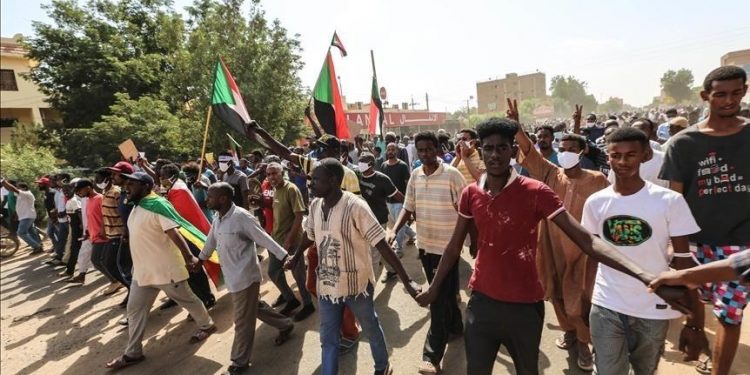While reconciliation among Gulf nations gave hope, Gaza war, dismissal of civilian governments in Tunisia, Sudan were dampeners
The Middle East and North Africa (MENA) region continued to witness plentiful events in 2021, from reconciliation among Gulf nations to Israel’s onslaught on the blockaded Gaza and the removal of civilian democratic governments in Tunisia and Sudan.
After almost four years of split between Qatar and its Gulf neighbors (Saudi Arabia, the UAE, and Bahrain) along with Egypt, a summit in the Saudi Arabian city of Ola brought reconciliation. At the end of the summit, leaders of five countries agreed to resolve their dispute and to end media war against each other, besides developing political and social contacts.

According to many experts, the end of former US President Donald Trump’s era along with the emerging threat from Iran’s nuclear program led the Gulf nations to set aside differences and come together.
While the decline in energy prices hit the oil-rich Saudi Arabia and Qatar, the COVID-19 pandemic also added to the economic woes in the region.
The tension in East Jerusalem’s Sheikh Jarrah neighborhood hogged the global headlines during the year.
Israel, Palestine conflict
For years, Israeli courts were hearing Jewish settlers and Palestinian residents. They ruled in favor of settlers, which was opposed by residents.
In November 2008, the al-Kurd family was evicted from their home. A year later Hanoun and al-Ghawi families were also thrown out of their residences.
The settlers were quick to occupy their homes and raised Israeli flags on top of them, marking a new phase of suffering by the Palestinians in the Sheikh Jarrah neighborhood.

On April, 12 Palestinian families in the neighborhood received fresh eviction orders from Israeli central and magistrates’ courts.
However, they rejected the decision. The Al-Kurd’s family members, Mohammed and Mona launched a campaign to raise support for their cause.
The Sheikh Jarrah tension snowballed into Israeli soldiers storming the Al-Aqsa Mosque – a third holy place for Muslims – on the night of Al-Qadr, in the holy month of Ramadan, when people were praying there. The scenes of Israeli soldiers beating Palestinians inside the mosque caused outrage.
The situation soon escalated into a full-blown Israeli military operation against the blockaded Gaza region.

The 11-days war led to the killing of 232 Palestinians, including 65 children and 39 women, along with the displacement of 120,000 citizens. At least 1,800 homes were completely demolished and 17,000 partly damaged. The conflict also led killings of 13 soldiers.
The year finally saw the longest-serving Prime Minister Benjamin Netanyahu losing power in Israel after he failed to secure the requisite number of votes in the Knesset.
He had survived four election rounds held in two years.
Change of guard in Israel, Iran
Naftali Bennet, an ultra-extremist leader of the New Right party, became the country’s 13th prime minister.

It is worth mentioning that Mansour Abbas, who heads the United Arab List (Ra’am) appeared a kingmaker in the Bennet-led coalition.
Facing charges of corruption, bribery, and dishonesty, it is not clear yet whether Netanyahu would be able to make a comeback.
The victory of ultra-conservative Ebrahim Raeisi in the Iranian presidential elections, replacing the reformist Hassan Rouhani was another major development witnessed in 2021.

Former chief of the judiciary, Raeisi won the presidential election by a landslide, securing 17.9 million votes out of the 28.9 million votes cast during the polls.
Raeisi, a high-ranking cleric-politician, is considered a hardline conservative figure in Iran and a merciless critic of the West, in particular the US.
A close aide to Iranian supreme leader Ayatollah Ali Khamenei, he was sanctioned by the US Treasury in November 2019, thus becoming the first Iranian president under sanctions at the time of taking office.
Ejection of democracies in Tunisia, Sudan
Tunisia, the birthplace of the Arab Spring in 2011, witnessed heightened conflict between the supporters and opponents of democratization of the Arab region.
On July 25, Tunisian President Kais Saeed decided to freeze parliament for 30 days, lift the immunity on its members, dismiss Prime Minister Hichem Mechichi and assume executive authority.

Many Tunisian parties, including the major Ennahda, denounced the president’s move and termed it a “coup” against the process of democratic transition that the country had experienced since 2011.
Many states, including the US and the EU, called the Tunisian president to restore the country’s parliament and maintain the democratic accomplishments in the country.
Tunisia was seen as the only country that succeeded in carrying out a democratic transition among Arab countries which witnessed popular revolutions toppling ruling regimes, including Egypt, Libya, and Yemen in 2011.
The Sudanese political situation was also subjected to additional hitches after the country’s military fully took over the political institutions on Oct. 25.
Dissolving the ruling Sovereign Council, the Army Chief Gen. Abdel-Fattah al-Burhan ordered a crackdown against the political leaders and the government officials. Prime Minister Abdallah Hamdok and his wife were also taken to an unknown destination.

In a way to show rejection to the army’s move, dozens of thousands of Sudanese took to the streets and were calling for a return to the civilian ruling in the country.
Amid rising protests and international pressure, the Sudanese army signed an agreement with the detained prime minister Hamdok, clearing his road to return to his position.
However, the protests continued with many Sudanese political forces accusing Hamdok of “letting them down” by reconciling with the army.






